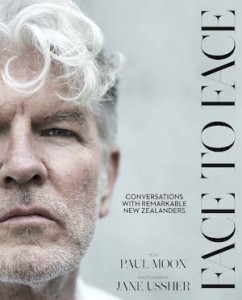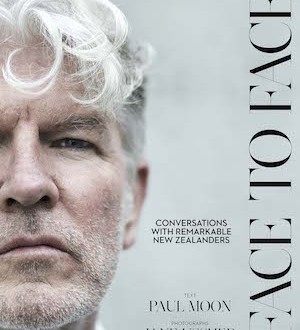 Conversations with Remarkable New Zealanders
Conversations with Remarkable New Zealanders
What do Dame Alison Holst, Hone Harawira and Tim Finn have in common? All appear in Face to Face, a book about 12 remarkable New Zealanders. Each chapter reads a like an intelligent dinner party conversation in which Paul Moon entices them to reveal more of themselves.
Moon’s long conversation with Dame Alison Holst was especially poignant as she has since developed Alzheimer’s. She takes pleasure in recounting her early cooking demonstrations on TV when she was simply told to come in and cook.
Dame Alison Holst set the format and style of the programmes herself, including how the props were arranged (a far cry from MasterChef these days!). And it was the same with her popular cooking tours of New Zealand, there was no-one to assist her or tell her what to do.
Her approach to cooking was unpretentious, simple and affordable but she also loved to tempt her audience into trying what were new ingredients then such as avocados.
In conversation with Sir Robert Jones, Paul Moon tries to tease out the complexities of this man. Just where does his hard-edged devotion to the market, his resistance to cell phones, his sneering at people with management degrees and his wonderfully weird views on women –come from? Is it from somewhere deep in his psyche or does he merely flaunt them for effect?
And how did he become so wealthy?
Sir Robert Jones explains: “The best way to get rich is to lie in bed and think. I’m not a bright bugger, but it’s about reading, being informed, being relaxed and thinking.”
Moon talks to two very different Maori people, the novelist Patricia Grace and Hone Harawira. Patricia shows through her writing what it feels like to be Maori and at the receiving end of much racism. But underlying this is not a blaming and unforgiving attitude but a plea that all parties should make greater efforts to understand each other.
Hone still comes across as an abrasive radical although age has mellowed him a little and he no longer goes out of his way to goad the police like he used to when he was younger.
Humility is a character trait that many of these remarkable New Zealanders share. As Michael Houston, the hugely talented concert pianist says in all sincerity, “I know if I have played well, but I have an attitude about that as well and it goes back to my attitude about my gift. It seems to me that I did nothing to get that gift. I just have it so I cannot take any credit for it.”
For some living in New Zealand has imbued their work with a special quality. For songwriter Tim Finn our landscape has become an even more artistic influence in his later years.
“Just going out to Piha, or travelling down to see Dad in Cambridge, past the Waikato River, out to the West Coast, up North, just soaking it up and feeling at home here.”
Sir Lloyd Geering first caught the public’s attention in the 1960s when the Presbyterian Church found him guilty of heresy. Moon prods and pokes him and takes pleasure in pointing out the contradictions in Geering’s theological thinking and whether he worked to subvert the very religion he claimed to belong to. But the 93 year old defends his position calmly and eloquently.
When Mai Chen arrived in New Zealand in the early 1970’s the Chens were the only Taiwanese in the whole of the South Island at that time so it was hard for them. Six year old Mai Chen knew only 2 words of English: watermelon and elephant. But she had a strong drive to succeed and went on to become a prominent lawyer with a strong social conscience.
“You wake up in the morning , and if you see things that nobody else sees and nobody else is doing anything about and you can do something about it , then I think you should.” This desire to be of service to others comes from her family background.
“A person with a background like mine knows that people need help,” she said. “And for us as a family there were times when we really needed help and we never got it. And I just know that if people had given us a little bit of help, then it would have made a lot of difference.”
All but one of the twelve interviewees (except for Mai Chen) has finished or is nearing the end of their careers. They range in age from 56 to 93 years. This makes it an especially interesting book for us as older New Zealanders to read as they have lived in our time and influenced our lives in various fields: culinary, science, religion and the arts.
The wonderful photographic portraits by acclaimed New Zealand photographer Jane Ussher and the large format make Face to Face a book that I will happily leave on our coffee table for others to delve into and enjoy.
Title: Face to Face. Author: Paul Moon and Jane Ussher. RRP $50.00. Imprint: Penguin.
By Lyn Potter Read more here








Join the Discussion
Type out your comment here:
You must be logged in to post a comment.